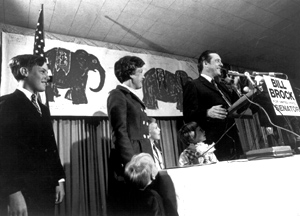
William E. "Bill" Brock III
Bill Brock, Chattanooga businessman, Republican congressman and senator, GOP National Party chairman, U.S. trade representative, and secretary of labor, was born in Chattanooga on November 23, 1930, to William E. Brock Jr. and Myra Kruesi Brock, heirs to a prosperous candy manufacturing company. Brock’s family had been prominent in business and state politics for generations, and his grandfather, William E. Brock, a Democrat, served in the U.S. Senate from 1929 to 1932. Bill Brock received a Bachelor of Science degree from Washington and Lee University before entering the United States Navy, where he served as a lieutenant from 1953 to 1956. Upon completion of his military service, Brock returned to Chattanooga and served as vice-president of the Brock Candy Company.
In 1962 Brock sought political office as a Republican and became the first GOP member to be elected from his congressional district in forty-two years; he served four terms in the House of Representatives. In 1964 the Jaycees chose Brock as the “Outstanding Young Man in Tennessee.” Six years later he defeated Albert Gore Sr. in a hotly contested race for the U.S. Senate. Brock’s victory, according to many critics, was due to a sophisticated use of code words that played on white Tennesseans’ racial fears and animosities. Brock, who had a conservative record and who opposed both the Civil Rights Act of 1964 and the creation of Medicare, strongly denied the allegations, noting his hopes for peaceful desegregation without the federally mandated measures advocated by Gore.
Controversy plagued Brock’s service in the Senate. In 1973 Brock denied allegations that he had taken money from a secret White House slush fund. During the 1976 campaign, allegations of impropriety again surfaced, when he was accused of taking an illegal contribution of three thousand dollars from the Gulf Oil Company. Brock denied taking this gift but repaid the company in hopes of settling the matter. In November 1976 Brock lost his Senate seat to Democrat James Sasser.
After his defeat Brock remained active in national politics. He became the national GOP Party Chairman in the late 1970s and won praise for his leadership in revitalizing the party after Watergate, in assisting Ronald Reagan’s election to the presidency, and in making possible the 1980 Republican majority in the Senate. Conservative activist and author William Bennett credited Bill Brock more than any other GOP leader with reorganizing the Republican Party during the post-Watergate period. During the Reagan administration Brock served as U.S. trade representative before being named secretary of labor. In these posts he tempered his conservative positions and became a supporter of affirmative action, parental leave, and worker retraining programs. John Seigenthaler, publisher of the Nashville Tennessean and a friend of Albert Gore, remarked on Brock’s sensitivity and tolerance for the needs of most Americans, noting that he had developed into a good secretary of labor.
In 1988 Brock resigned his post in the Reagan administration to help manage the failed presidential bid of Robert Dole. After leaving politics in the late 1980s, Brock formed the Brock Group to advise foreign and domestic companies on international trade policy. In the early 1990s his firm earned almost one million dollars assisting the Mexican government in the passage of the North American Free Trade Agreement. In 1990 Brock and his wife Sandy established residency in Annapolis, Maryland, and four years later he sought election to the U.S. Senate from that state, though no candidate has ever won election to the Senate from two different states since voters began directly electing senators during the Progressive era. Running against Democratic incumbent Senator Paul S. Sarbanes, one of the most liberal members of Congress, Brock failed in his bid for office, despite the conservative landslide of 1994.



